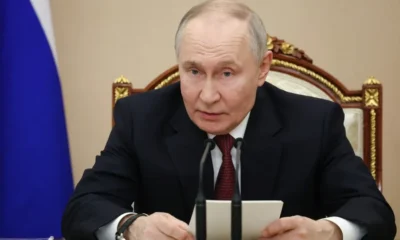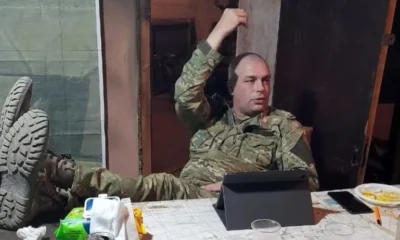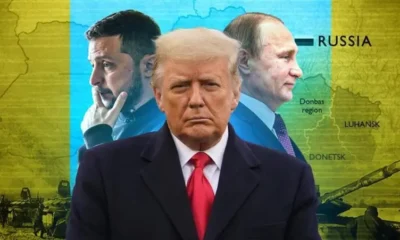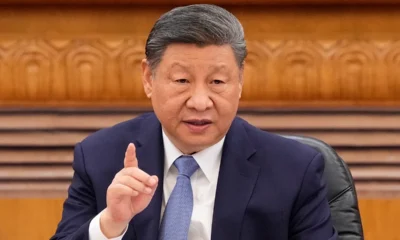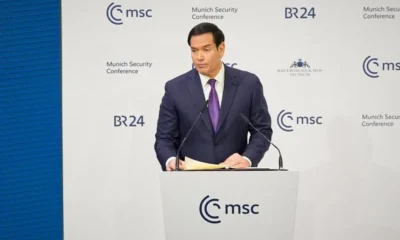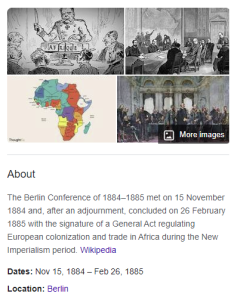Investigation
US Soldier Detained in Russia; White House Confirms Second American in Custody
BY GUEST ESSAY:
A US soldier has been detained in Russia, with the White House confirming the detention of a second American. The circumstances surrounding their arrests remain unclear, heightening tensions between the two nations.
The detention of the US soldier marks yet another escalation in diplomatic tensions between Washington and Moscow. The White House has called for the immediate release of both individuals and is closely monitoring the situation.
The identities of the detained Americans have not been disclosed, and details regarding the reasons for their detention are scarce. The US Embassy in Moscow is reportedly working to provide consular assistance to the individuals and their families.
The incident comes amid strained relations between the United States and Russia over various geopolitical issues, including Ukraine, cyberattacks, and human rights violations. The detention of American citizens further complicates an already precarious diplomatic situation.
As both countries navigate this latest development, questions loom over the potential implications for bilateral relations and the efforts to de-escalate tensions. The detainment of US citizens in Russia underscores the challenges of maintaining diplomatic stability in an increasingly volatile international landscape.
Investigation
Mogadishu’s Disinformation Machine Turns on the UAE
ASSESSMENTS
A Critique of the Hassan Sheikh Mohamud Administration and the Halane Enigma
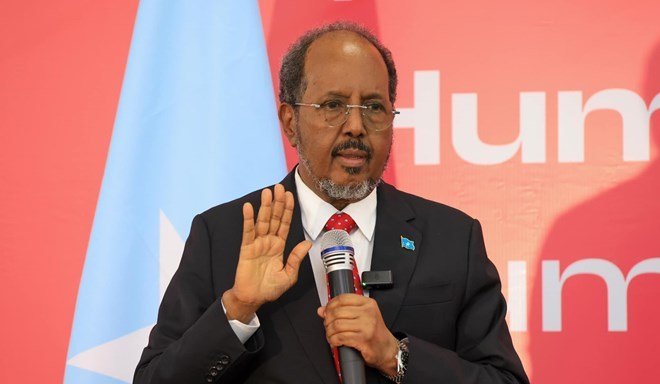
The current state of Somalia under President Hassan Sheikh Mohamud is not merely a period of governance; it is, by many accounts, a nadir in the nation’s tumultuous history. Far from leading a sovereign state, President Mohamud presides over what has, tragically, devolved into a personal enterprise, a “company” seemingly owned by him and his family, with credible independent reports even linking his administration to collaboration with the very terrorists, Al-Shabab, that plague the nation.
This is an administration widely perceived as the worst in the world, a stark betrayal of the Somali people’s aspirations for peace, security, and self-determination.
The core of this systemic failure lies within the fortified walls of Halane, the so-called “forbidden fortress of Somalia’s foreign minders.” This enclave, rather than fostering genuine state-building, has morphed into a self-perpetuating, colonial-like outpost, sustained by the apathy of generations of Somalis who have known no government truly worthy of their name.
A small, entrenched group, often referred to as the “Halane Mafia,” has, for two decades, completely hijacked the Somali administration. This clique, inherently against the very notion of Somalia becoming a secure, functioning, and independent country, actively resists the transfer of real power to Somali hands. Their grip is so absolute that it extends to denying Somalis even opportunities within their own land, as shockingly exemplified by the United Nations Support Office in Somalia (UNSOS) job advertisement for a Programme Support Officer in Mogadishu, explicitly stating: “Candidates must be a national of a country other than the country of assignment”—a blatant prohibition on Somali nationals from a role meant to support their own nation.
This is not capacity building; this is colonial perpetuation, where “failed Western actors” continue to preach development while ensuring continued dependence on foreign consultants and unreliable aid, now abandoning Somalis to their fate.
The consequences of this entrenched dysfunction are dire and far-reaching. Innocent Somalis are routinely mistreated in their own country, and hope, once a flicker, is rapidly fading. This ministerial failure is palpable, and the frustration simmers beneath the surface of a populace that increasingly sees no difference between the foreign-controlled Halane and the supposedly sovereign Villa Somalia. The clarion call, “Out with Halane,” grows louder by the day, reflecting a deep-seated yearning for genuine Somali leadership.
In this context of profound domestic instability and international manipulation, President Hassan Sheikh Mohamud’s alleged intent to invade and wage war on Somaliland, purportedly due to dissatisfaction with its security situation, is not just a dangerous escalation but a grotesque irony.
To seek conflict with a stable, self-governing entity like Somaliland, while his own administration is embroiled in accusations of corruption, collaboration with terrorists, and being controlled by a foreign-backed cabal, speaks volumes about the priorities and capabilities of his leadership.
The security situation in Somaliland, in stark contrast to the chaos he presides over, is a testament to its own resilience and self-governance. This proposed aggression is a desperate diversion, a dangerous gamble by a leader whose legitimacy and effectiveness are crumbling under the weight of his own administration’s failures.
The long-term implications of this sustained misgovernance and external interference are catastrophic for Somalia’s future, threatening to condemn generations to perpetual instability and foreign subjugation.
ASSESSMENTS
The Alarming Reality of Data Exploitation in Somaliland

Who Really Owns Your Data? The Disturbing Truth About Somaliland’s Telecommunications.
In today’s digital economy, data is often referred to as the “new oil,” recognized not just for its economic value but also for its strategic significance. As Somaliland continues its quest for international recognition, it must first address a crucial issue: the ownership of its data. The realities of those who use telecommunications and banking services provided by companies affiliated with Somalia are alarming. It is time for the government and citizens to wake up to the consequences of rampant data exploitation.
When we deposit funds into services like ZAAD or e-Dahab, we are not merely engaging in a financial transaction. We are giving away pieces of our private lives—our spending habits, our communications, and our personal information—all of which wind up in the hands of companies whose primary operations are rooted in Mogadishu, not Hargeisa. Two major telecommunications firms operate in Somaliland: Somtel and Telesom, both linked to Somalia. The implications of using their services extend far beyond convenience; they put Somalilanders at risk by allowing their data to be siphoned off to a government that has openly expressed hostility toward Somaliland’s aspirations.
Imagine this scenario: hundreds of thousands of Somalilanders are depositing money into their mobile accounts daily, with each transaction and phone call registered in databases managed far from their control. In a city like Hargeisa, if even half a million citizens each deposit a modest sum, this can easily aggregate to a billion dollars—a staggering figure. These telecommunications giants, profiting from this data flow, may also sell user information or track behaviors to create targeted advertisements. This allows them to manipulate the daily lives of Somalilanders, capitalizing on personal information to maintain their market dominance. Why, then, are we allowing such a situation to persist?
Our predicament is compounded further by the actual ownership of banks in Somaliland. Many banks here are owned by Mogadishu-based interests, and like telecommunications companies, they lack any genuine allegiance to Somaliland. When you engage with these financial institutions, you’re often inadvertently feeding information that the central government in Somalia can exploit, potentially undermining Somaliland’s security.
The absence of stringent regulations and a clear legal framework around data ownership makes us vulnerable to exploitation. Somaliland’s Protection of Personal Information Act is a step in the right direction, yet it does not explicitly define data ownership, leaving ambiguity and practical gaps for those who operate within our emerging digital economy.
This situation endangers not just your data but your very sovereignty. Any time you use Somtel, Telesom, consider where your personal information goes and how it can be used against you. Security departments, government ministries, and everyday citizens habitually use these services without understanding the risks involved. Every phone call, every transaction, accumulates into a profile that could be misused at any time, either politically or financially.
If Somaliland is serious about gaining recognition on the world stage, the government must prioritize control over its data. Consider the implications of conducting routine governmental tasks, where sensitive information is transmitted through systems that are not under Somaliland’s direct control. If these services are fundamentally rooted in a reservation of power by Mogadishu, then Somaliland risks not just economic exploitation, but also potential sabotage during sensitive negotiations for autonomy or recognition.
The case for Somaliland’s internal data governance becomes clearer when it is said that telecommunications giants will not remain in business if Somaliland gains its legal recognition. The key to altering this narrative is addressing data sovereignty. As experience indicates, robust recognition from Western nations, including the United States and European Union, could transition our telecommunications sector to more reputable, international players who prioritize data security and consumer rights.
The looming question is: what is preventing Somaliland from asserting its own frameworks around data ownership? Existing partnerships with companies from Mogadishu may be more of a hindrance than a help to the recognition process. While we continue to rely on these entities, we are inadvertently supporting a status quo that treats our aspirations as second-class desires.
Now is the time for the Somaliland government to take power back into its own hands. First, it must establish comprehensive policies on data ownership and privacy. Investments in local technological infrastructures can catalyze the emergence of secure, independent alternatives in telecommunications and banking—ones that bolster Somaliland’s economy while guaranteeing protection of individual data rights.
We call upon our leaders not only to support a strong legal framework for data ownership, but also to educate our populace on why this is crucial for our national security and sovereignty. If we do not act now to control our data, we risk perpetuating a cycle where foreign powers dictate our future while we remain oblivious to the forces operating just beyond our borders.
Editor's Pick
Somali Student Assault Incident Sparks Outrage in Bristol and Across the UK
Viral Video of Assault at Bristol School Raises Concerns About Bullying and Discrimination
May 24, 2024 – LONDON (waryatv.com) – A recent incident involving a Somali student being assaulted by peers at a Bristol school has ignited strong reactions in the city and across the UK. The video of the assault, which surfaced on social media, shows a group of students forcefully holding the shirt collar of another Somali student and attempting to push their head into a toilet.
The disturbing event occurred in early May at Bristol’s Orchard School. The footage has led to an outpouring of anger from parents and children’s rights advocates, compelling the school to release an official statement condemning the incident as “intolerable” and affirming that a thorough investigation is underway.

“I want to assure you that our protection team is fully investigating the matter and working closely to support, and assist, the families of those identified, in accordance with our Anti-Harassment policies. Orchard is committed to non-discrimination and will not tolerate bullying of any kind,” the school stated.
The Somali community in Bristol and throughout the UK has expressed significant outrage. Many Somali parents took to social media, describing the incident as “a new issue that needs to be addressed collectively.” Khalil Adan Abdi, head of the youth organization ‘Horn Youth’ in Bristol, told the BBC that the incident has deeply disturbed the Somali community, prompting immediate engagement with the school. Meetings have been organized to discuss the incident and seek solutions.
“The reason why they are so angry is that Somali culture has not been introduced by these students,” Khalil explained. He noted a rise in humiliating acts among students and emphasized the need for community and school collaboration to address and prevent such behavior.
Bullying involves degrading actions intentionally inflicted on an individual or group, leading to emotional or physical harm. It can include stalking, verbal abuse, physical aggression, and other forms of humiliation. These actions are typically perpetrated by individuals who hold more power or influence over the victim, aiming to assert dominance.
Surveys and data suggest an increasing rate of bullying in UK schools. The United Anti-Bullying Alliance conducted a survey with around 65,000 students across England, revealing that approximately one in four students reported being bullied occasionally or frequently.
This incident highlights the urgent need for effective anti-bullying measures and greater cultural awareness in schools to ensure a safe and inclusive environment for all students. The Somali community’s response underscores the importance of addressing such issues collectively to prevent future occurrences.
Corruption
The Light of Somaliland: A Tale of Hidden Dark Forces and Mysterious Illuminations
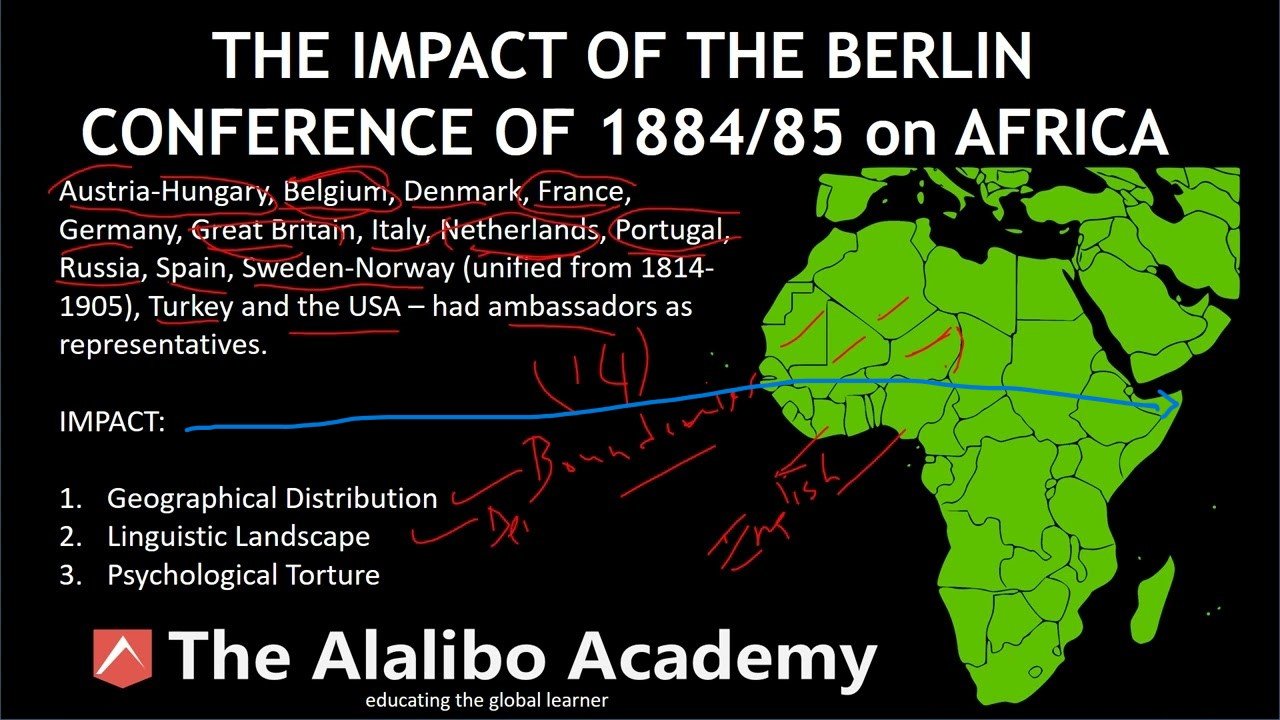
Discover the hidden battle against a mysterious light in Somaliland that has sparked international intrigue and a legacy of conflict. Unravel the story behind the fight for this enigmatic region.
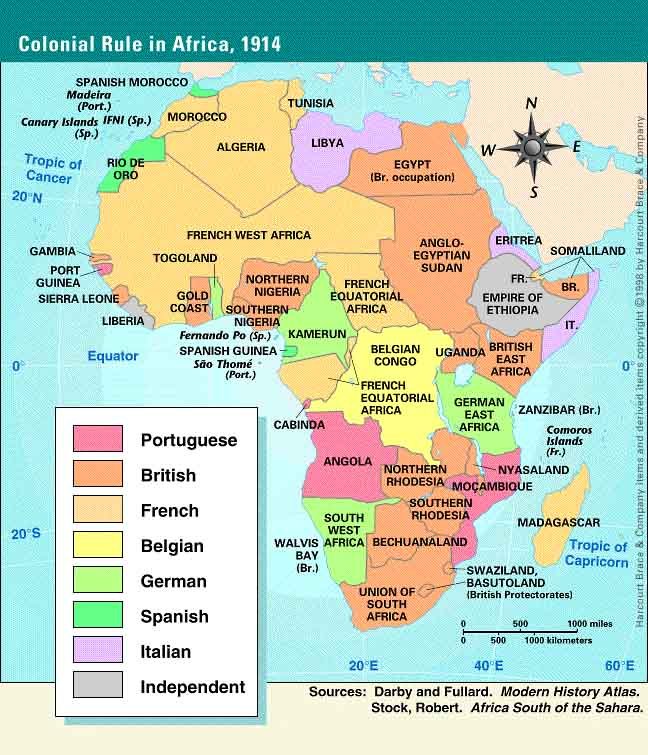
By Kasim Abdulkadir:
In the rugged mountains of Sanaag, where the air hums with ancient secrets, lies Somaliland—a land shrouded in mystery and whispered legends. For centuries, this region has been the focal point of a clandestine struggle between forces both seen and unseen, driven by an enigmatic light that many believe holds untold power.
The Genesis of a Secret War
It was in 1884, amid the chaotic fervor of the Berlin Conference, that the seeds of this conflict were sown. European powers gathered to carve up the African continent, but beneath the diplomatic veneer, darker agendas were at play. A black map, stark with two glaring white areas, was discreetly circulated among the elite. These regions were Somaliland and Shaam in the Middle East—zones marked by a mysterious light that Lucifer himself, the great fallen angel, declared a threat to his sinister designs.
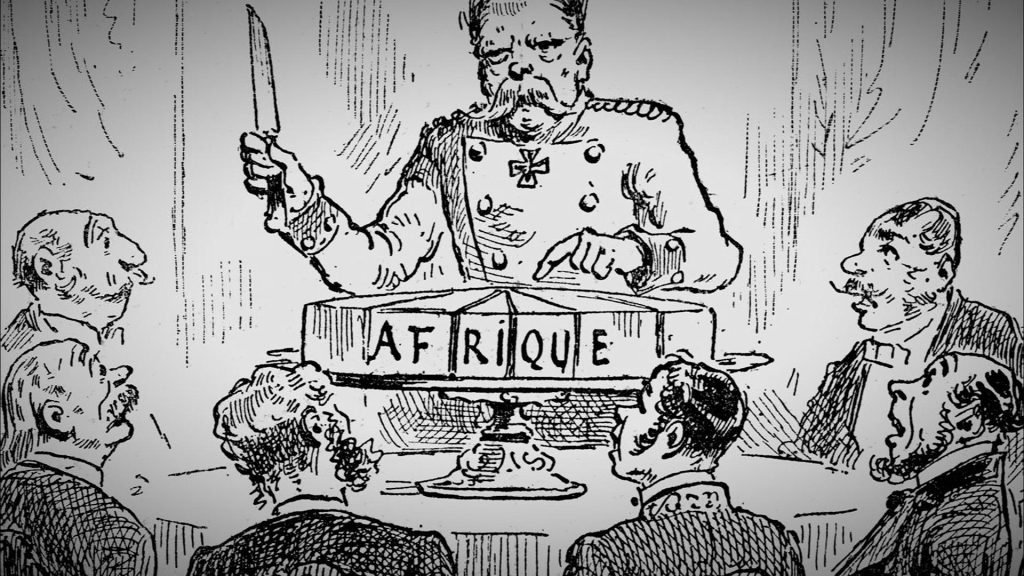
Lucifer, seated in the shadows of that fateful meeting, whispered to his followers. “These lights in Somaliland and Shaam,” he warned, “must be extinguished. They are the beacons of hope and resistance against our dominion. Steal their minds, corrupt their bodies, and sow endless discord.”
The Unseen Battles
Decades passed, and the struggle for Somaliland’s light continued to rage, often unseen by the world. The great powers—Britain, France, Germany—each took their turn, manipulating conflicts and fostering divisions. Yet, despite their efforts, Somaliland stood resilient, its light unwavering.
Modern efforts saw new tactics. The shadowy forces behind global powers instigated wars in Lasanod, hoping to draw in international peacekeepers and destabilize the region from within. The goal? To change the very fabric of Somaliland, starting with its symbol—the flag that carried the light. “Convince them,” they schemed, “that recognition will come with changing the text and color of their flag. Anything to dim that light.”
The Dark Plans Unveiled
From the halls of power to the streets of Hargeisa and Burco, the conspiracy spread. Khat, a local drug, was laced with toxic chemicals, its consumption encouraged to poison the minds and bodies of Somaliland’s people. Women were particularly targeted, told that khat would prevent childbirth, aiming to cripple the nation’s future.
Meanwhile, Somalis imprisoned abroad were slated for a dubious return, a plan set for the middle of 2025, aiming to introduce chaos. Free alcohol and hashish for those sickened by tainted khat became the norm, another tool to erode the society from within.
The Battle for Souls

Religious scholars were not spared. They were lavishly bribed, distracted with wealth and divided against one another, ensuring perpetual conflict. The Qur’an, a source of solace and guidance, was twisted into a tool of division, with teachers paid to mislead the youth.
The Unyielding Light

Yet, despite these relentless efforts, the light of Somaliland persists. It is a testament to the indomitable spirit of its people—a beacon that refuses to be dimmed. As new generations rise, aware of the dark forces at play, they continue to resist, guarding their heritage and the mysterious light that defines their land.
Stay tuned for the next installment of this saga, where the intricate web of deception deepens and the fight for the soul of Somaliland takes an even more perilous turn. Will the light endure, or will the darkness finally prevail? The story is far from over.
Drugs
Europe’s Cocaine Kings: The Rise of Balkan Gangsters as Top Suppliers
In recent years, Europe has witnessed a surge in cocaine consumption, with the drug’s availability reaching unprecedented levels. Behind this booming trade lies a network of organized crime groups from the Balkans, who have emerged as Europe’s top cocaine suppliers.
BY GUEST ESSAY:
This special report delves into the intricate web of criminality that fuels the continent’s cocaine epidemic, tracing the origins, operations, and global connections of Balkan gangsters in the illicit drug trade.
The roots of Balkan organized crime can be traced back to the dissolution of Yugoslavia in the 1990s. Amid the chaos of war and political upheaval, criminal networks flourished, capitalizing on the breakdown of law and order to establish lucrative enterprises in smuggling, trafficking, and extortion. Over time, these criminal syndicates expanded their operations beyond national borders, infiltrating Europe’s underworld and diversifying their illicit activities.
Driven by insatiable demand and staggering profits, Balkan gangsters have carved out a dominant role in Europe’s cocaine trade. Leveraging their extensive networks and strategic alliances with South American cartels, these criminal organizations oversee the smuggling of vast quantities of cocaine into Europe through a variety of routes, including maritime, air, and land channels. From clandestine ports in the Balkans to bustling European cities, the flow of cocaine has become a lucrative and highly profitable enterprise for Balkan gangs.
The rise of Balkan gangsters as major players in the cocaine trade has not gone unnoticed by international law enforcement agencies. Through sophisticated intelligence-gathering efforts and collaborative operations, authorities have uncovered the intricate web of connections linking Balkan crime syndicates to their counterparts in South America, Africa, and beyond. These global connections enable Balkan gangs to orchestrate large-scale cocaine shipments and evade detection by law enforcement agencies, posing a formidable challenge to efforts aimed at disrupting their operations.
In their quest for dominance in the cocaine market, Balkan gangsters have resorted to violence, intimidation, and coercion to protect their interests and eliminate rivals. From targeted assassinations to brutal turf wars, the criminal underworld of the Balkans is characterized by a culture of brutality and impunity. Law enforcement agencies across Europe have struggled to contain the escalating violence fueled by rivalries between competing gangs vying for control of lucrative drug markets.
The ascendancy of Balkan gangsters as Europe’s top cocaine suppliers poses significant challenges for law enforcement agencies, policymakers, and society at large. The unchecked proliferation of cocaine has fueled addiction, organized crime, and violence, undermining public safety and social cohesion. Efforts to combat the cocaine trade must address the root causes of demand, dismantle criminal networks, and enhance international cooperation to disrupt the flow of illicit drugs into Europe.
In conclusion, the rise of Balkan gangsters as Europe’s top cocaine suppliers underscores the complexity and magnitude of the continent’s drug problem. As authorities grapple with the challenges posed by organized crime, concerted efforts are needed to tackle the underlying drivers of drug trafficking, strengthen law enforcement capabilities, and promote international cooperation to combat the scourge of cocaine addiction and its devastating consequences on individuals, communities, and societies across Europe.
Analysis
The Rohingya Genocide Case: Implications for International Justice and Geopolitical Dynamics
Exploring the Potential for International Warrants and the Global Ramifications
By Kasim Abdulkadir:
The prediction of international warrants in the Rohingya genocide case by a human rights lawyer marks a crucial development in the pursuit of justice for one of the most egregious human rights atrocities of the 21st century. To fully grasp the significance of this event, it’s essential to examine the historical context, geopolitical implications, socioeconomic factors, and potential future impacts.
The persecution of the Rohingya ethnic minority in Myanmar dates back decades, rooted in systemic discrimination and state-sponsored violence. The Rohingya have faced marginalization, disenfranchisement, and mass atrocities, culminating in waves of displacement and refugee crises.
The Rohingya genocide case has far-reaching geopolitical implications, with implications for international law, human rights norms, and diplomatic relations. The pursuit of justice in this case intersects with broader geopolitical tensions, including Myanmar’s relations with neighboring countries and its standing in the international community.
Socioeconomic factors play a significant role in the Rohingya genocide case, as economic interests, resource competition, and power dynamics shape the conflict. The exploitation of ethnic and religious divisions exacerbates tensions, while economic disparities contribute to marginalization and vulnerability.
The prediction of international warrants in the Rohingya genocide case could have profound future impacts on global justice, accountability, and diplomatic relations. It may signal a shift towards greater accountability for perpetrators of mass atrocities and a commitment to upholding human rights principles on the international stage.
Multiple perspectives must be considered in analyzing this event, including the perspectives of the Rohingya victims, the Myanmar government, the international community, and human rights organizations. Each stakeholder brings unique insights and interests to the table, shaping the discourse and potential outcomes of the case.
Possible scenarios arising from the prediction of international warrants include increased pressure on the Myanmar government to cooperate with international investigations, diplomatic tensions between Myanmar and other countries, and renewed calls for accountability from the international community.
In conclusion, the prediction of international warrants in the Rohingya genocide case represents a pivotal moment in the pursuit of justice and accountability for one of the most egregious human rights violations in recent history. Its significance extends beyond legal proceedings, shaping global perceptions of justice, human rights, and international diplomacy.
Crime
Amnesty Accuses Somali Government of Drone Strikes Killing Civilians, Calls for Investigation

By GUEST ESSAY;
Amnesty International has accused the Somali government of killing over two dozen civilians in drone strikes, urging both the Somali and Turkish governments to investigate the incidents for potential war crimes.
The strikes, conducted by Turkish drones, targeted Islamist insurgents in the southern Somali region of Lower Shabelle on March 18. According to Amnesty, 23 civilians, including 14 children and five women, were killed in the strikes, with 17 others wounded, including 11 children and two women.
The Lower Shabelle region has been heavily affected by the insurgency of the extremist group Al-Shabaab, designated as a terrorist organization by the US government. The drone strikes followed heavy fighting between Al-Shabaab and Somali security forces in the area, with the extremist group storming a military base in March, resulting in the deaths of nearly 20 soldiers.
Tigere Chagutah, Amnesty International’s regional director for East and Southern Africa, called for the investigation of the strikes as war crimes, emphasizing the need for truth, justice, and reparations for the affected families.
The bombs dropped from the Bayraktar TB2 armed drones were identified by Amnesty as “MAM-L glide bombs,” which are also manufactured in Turkey along with the TB2 drones.
Somalia hosts one of the largest Turkish military bases abroad, with Turkey providing training to Somali troops since 2017 and supplying Bayraktar TB2 drones to support the fight against terrorism. The two countries also signed a cooperation deal for Somalia’s maritime security in February.
Amnesty stated that it had reached out to both the Somali and Turkish governments for details of the strikes, including information on the military forces controlling the drones at the time of the strikes, but received no response. Additionally, the United States Africa Command (AFRICOM) did not respond to Amnesty’s inquiries regarding the involvement of US forces in the strikes.
-

 Somaliland1 month ago
Somaliland1 month agoF-35s Over Hargeisa: The Night Somaliland’s Sovereignty Went Supersonic
-

 Somalia1 month ago
Somalia1 month agoAid Destroyed, Trust Shattered: Somalia Loses U.S. Support for Good
-

 Terrorism1 month ago
Terrorism1 month agoForeign ISIS Pipeline Exposed: Puntland Captures Dozens of Non-Somali Fighters
-

 Somaliland1 month ago
Somaliland1 month agoSomaliland at Davos: The Moment Somaliland Entered the World’s Inner Circle
-

 Terrorism1 month ago
Terrorism1 month agoAmerica Pulls Back From Somalia but Doubles Down Next Door
-

 Top stories2 months ago
Top stories2 months agoSomali Pirates Hijack Chinese Fishing Vessel off Puntland Coast
-

 Middle East2 months ago
Middle East2 months agoUS War Plans Against Iran Enter Advanced Stage
-
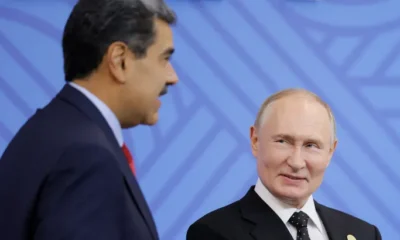
 Analysis2 months ago
Analysis2 months agoWhy Putin Is Silent on Maduro’s Abduction—and the Limits of Putin’s Power


